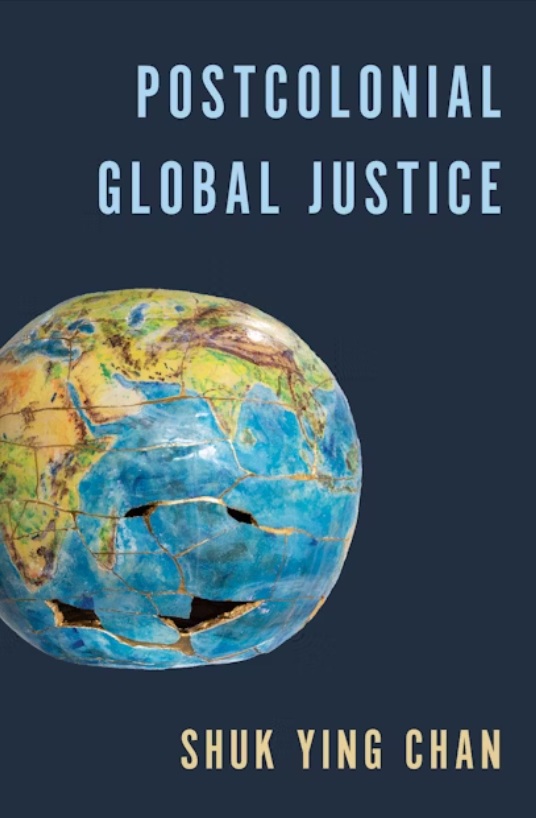The Relevance of Anticolonial Thought Today – An Interview with Shuk Ying Chan

Classical western colonialism is dead, but neocolonialism is alive and well. In this context, anticolonial thought is very much relevant for addressing today’s global injustices, argues University College London Lecturer in Political Theory Shuk Ying Chan and author of the recently published book Postcolonial Global Justice in the interview that follows.
C.J. Polychroniou: The history of capitalism is intertwined with economic and racial exploitation, oppression, and violence. Moreover, there is a well-documented link between capitalism and the climate crisis and economic growth works at the expense of environmental sustainability. In light of the above problems, it is hardly surprising that the pursuit of global justice also has a long and complex history, with mixed results. Now, your newly published book titled Postcolonial Global Justice aims to develop an account of postcolonial global justice for the challenges facing the neocolonial age. What does neocolonial exploitation look like, and what should a postcolonial global justice project entail?
Shuk Ying Chan: Neocolonial exploitation happens where one party is asymmetrically dependent on others, and that dependence is weaponized against them when other parties offer them terms of interaction (e.g., trade, aid, and investment terms) that hinder their ability to escape a position of vulnerability. In the book I discuss bilateral investment treaties as a contemporary example of neocolonial exploitation, where capital-poor countries are effectively bound by the terms of these treaties to avoid enacting or enforcing policies that could address domestic and global inequalities—for example, stronger capital controls, stronger labour protection, policies that favour the development of a diversified domestic economy, taxation of the wealthy, etc. At the same time, neocolonial exploitation enables the exploiter to enrich themselves even further; in the case of investment treaties, investors are empowered to sue states if the latter enacts policies and regulatory measures that threatens their profit.
In face of this, I develop an account of “postcolonial global justice” which is centered around an ideal of persons across the world relating as equals. This account implies that a global economic system that entrenches rather than rectifies inequality must be rethought and contested, and I argue that this can justify political resistance such as international lawbreaking from capital-poor countries and their citizens. In practice, this will usually mean grassroots movements pushing their states to refuse to comply with things like agreeing to pay large settlement sums to investors, even if it means violating the terms of an investment treaty. These political actions are justified because postcolonial citizens have a claim to escape the position of economic vulnerability that persistently places them at the mercy of others.
 You contend that the anticolonial thought found in the writings of thinkers such as Frantz Fanon, Kwame Nkrumah, Jawaharlal Nehru, and Aimé Césaire are worth revisiting and for reasons beyond intellectual curiosity. Why do you think that anticolonial thought remains relevant for understanding and addressing today’s global injustices?
You contend that the anticolonial thought found in the writings of thinkers such as Frantz Fanon, Kwame Nkrumah, Jawaharlal Nehru, and Aimé Césaire are worth revisiting and for reasons beyond intellectual curiosity. Why do you think that anticolonial thought remains relevant for understanding and addressing today’s global injustices?
First, up until recently anticolonialism was thought to be just another form of ethnocultural nationalism, meaning that decolonization was seen as almost synonymous with postcolonial peoples attaining a nation-state of their own, and anticolonialism meant—crudely put—keeping foreign powers and foreign influence at bay. But if we take a closer look at these four key anticolonial thinkers, for example, we’ll see that their nationalism is highly qualified, and some of them—like Césaire—didn’t even think that attaining an independent postcolonial state was necessary for realizing decolonization. Instead, as I argue in the book, these thinkers thought of decolonization as realizing an ideal of equality, whereby colonial racial hierarchies would be replaced with relations of equality in which persons could regain their humanity and flourish. The nation-state could be an instrument to attaining this, but it can also often be a hindrance, and so part of the motivation of the book is to decouple anticolonialism from nationalism, and to show how taking anticolonial thinkers seriously on their own terms can lead us to reinterpret demands for decolonization differently, and (in my opinion) more radically.
Second, these thinkers wrote at the threshold of imperial breakdown—that is, at a time when decolonization was becoming a real possibility and yet the disappointments that came later with the postcolonial state had not yet occurred. So, their thinking is characterized with an openness to political experimentation that I think we sorely need today. The financial and ecological crises of recent decades have showed us that we need something more than piecemeal fixes to the global economy. Instead, we need to rethink global capitalism, as difficult as it is to get the political will to do that. I think these thinkers give us resources to think about the big picture: what kind of global political economy do we need to enable persons and peoples to live and relate to each other as equals? Their answers varied, of course, but inevitably consisted of some form of democratic socialism. These thinkers saw very clearly that capitalism was never going to deliver freedom from imperialism, because a system that is inherently about a minority accumulating ownership of the means of production at the expense of the majority will always entail a geopolitics characterized with domination and (racialized) exploitation.
The world has become more capitalist and more globalized. Through what means, tactics, and strategies can a postcolonial global justice project rectify today’s social and economic inequalities?
In the book I discuss transnational social movements that build coalitions that cross national boundaries as key to addressing today’s social and economic inequalities. The most effective kinds of coalitions will not only focus on coming up with ways to threaten the material interests of the capital-owning class (for example, by seizing foreign assets, or going on strike), but also building a transnational identity and sense of solidarity in the process of contestation. I draw on Nehru’s interwar efforts at creating a global anticolonial movement through the League Against Imperialism to think about how contemporary movements can do the same, and I look at the world’s largest peasant movement, La Via Campesina, as an example of this. I also argue that states have an important role to play in the realization of postcolonial global justice, for example by forming alliances that can push back against unfair terms of trade and investment.
What about cultural imperialism in the 21st century? What are its features and how are they distinct from past practices? Moreover, how can we restore truth in history and the status of historically oppressed groups as equal social agents?
Cultural imperialism in the 21st century doesn’t mainly happen through brute coercion (although of course this still happens in settler colonial settings), but primarily through the market. Against a background of deep inequality in capital for cultural production, societies have very unequal capacities to gain global exposure for their cultural goods, either through exports or other kinds of global dissemination (such as publishing). The result is persistent patterns of cultural globalization whereby dominant Global North states have a disproportionate influence in a range of areas like music, film, literature, and not to mention knowledge production more broadly. I argue in the book that this is problematic because marginalized groups are not by and large recognized as cultural producers and therefore not seen as equal value-makers. We can think of comments like Trump’s description of certain countries as “shitholes,” for example, or narratives that place European powers and America as being the creators of highly valued cultural elements such as classical music, literature, popular films, etc. Drawing from Césaire (who was a poet in addition to being an anticolonial activist-leader), I argue in the book that when some groups are seen as less capable or incapable of creating enduring value (of which culture is an important kind), this lends support to the idea that they deserve to occupy an inferior social position because they depend on the genius and tutelage of others. So, the concern with cultural imperialism here is not so much the loss of local cultures in face of cultural globalization, but rather a concern with the inequality of status that can reinforce or legitimize other kinds of problematic relations, such as domination.
To counter this, in the book I suggest two broad kinds of strategies: first, to recover the role of marginalized groups in creating what we deem valuable forms of culture today; second, to empower these groups to create culture in ways that are public and visible to others. These broad strategies entail more specific initiatives like revising vehicles of public memory (e.g., museums) and education curricula to reflect the contributions of historically oppressed groups, funding and platforming artists and cultural producers from those groups, etc. At the global level, it entails at least exempting cultural goods from free trade rules so that countries can better nurture and support local cultural production. There are other measures such as cultural reparations that I mention in the book, and these are all meant to prioritize the empowerment of members of historically oppressed groups to act as value-makers in the cultural sphere.
How does a postcolonial global justice project handle the cultural relativism vs internationalism conundrum?
I think that an ideal of equal standing whereby persons are treated with equal respect and concern is a value that most people, despite cultural differences, can endorse upon reflection. This is because even groups that do not endorse equality internally for their members would not normally want to be subjected to dominating relationships or, more broadly, be treated as inferior to others. This is evident from the persistent demand of colonial subjects (past and present) to be treated as equals instead of being put under the tutelage of colonial powers. The anticolonial thinkers in the book who put forth critiques of colonial hierarchies are precisely making such demands. Additionally, it’s important to note that equal standing doesn’t need to manifest in institutional design and social practice in the same way across cultural contexts. It’s a highly abstract ideal that has critical force when we look at real-world relations that are objectionable, but its abstract nature means that realizing it in practice will inevitably entail variation in different social and cultural settings.
Global governance is highly undemocratic and, as recent global events can confirm, international law is dead. Is global democracy really possible? If so, what should an approach to global democracy entail?
Up until recently, political theorists who have written about the question of global democracy have either dismissed democracy as relevant when it comes to global politics or come up with what I think are far too utopian proposals of democratic world parliaments and global constitutions. The final chapter of the book argues that we need to approach global democracy very differently, precisely for the reasons you mention here. We should take seriously the fact that global governance (such as the enforcement of international law) tends to be heavily biased in favor of dominant powers and that this has significant consequences for people living in Global South countries. This means it is important that we don’t give up the ideal of more egalitarian decision-making at the global level, but to get there, we need to first emphasize power-building among the marginalized and oppressed, before pursuing global institutional projects that can only offer empty promises of equality. This is why I ultimately turn to what I call counter-hegemonic coalition building at the global level, and I think we need to ask questions about how to build and maintain these (state and non-state) coalitions if we want to democratize global governance, rather than focusing on institutional design.
C.J. Polychroniou is a political scientist/political economist, author, and journalist who has taught and worked in numerous universities and research centers in Europe and the United States. Currently, his main research interests are in U.S. politics and the political economy of the United States, European economic integration, globalization, climate change and environmental economics, and the deconstruction of neoliberalism’s politico-economic project. He is a columnist for Global Policy Journal and a regular contributor to Truthout as well as a member of Truthout’s Public Intellectual Project. He has published scores of books and over one thousand articles which have appeared in a variety of journals, magazines, newspapers and popular news websites. Many of his publications have been translated into a multitude of different languages, including Arabic, Chinese, Croatian, Dutch, French, German, Greek, Italian, Japanese, Portuguese, Russian, Spanish, and Turkish. His latest books are Optimism Over Despair: Noam Chomsky On Capitalism, Empire, and Social Change (2017); Climate Crisis and the Global Green New Deal: The Political Economy of Saving the Planet (with Noam Chomsky and Robert Pollin as primary authors, 2020); The Precipice: Neoliberalism, the Pandemic, and the Urgent Need for Radical Change (an anthology of interviews with Noam Chomsky, 2021); and Economics and the Left: Interviews with Progressive Economists (2021).


